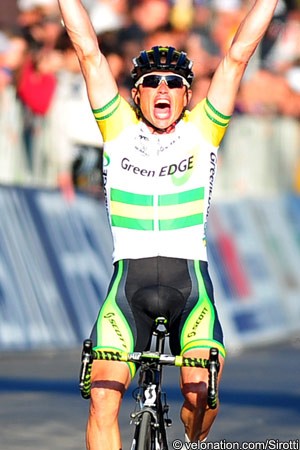Australian Orica GreenEdge rider: ‘I’ve been clean my whole career’
 Milan-Sanremo winner Simon Gerrans has described the shock he got when he rode his first Tour de France, saying that the speed and difficulty of the race were something that didn’t quite expect. The Australian has said that he believes that the issue was related to the doping affecting the sport, but says that things are far better now, claims he’s never doped and said and that it is far more possible to win clean.
Milan-Sanremo winner Simon Gerrans has described the shock he got when he rode his first Tour de France, saying that the speed and difficulty of the race were something that didn’t quite expect. The Australian has said that he believes that the issue was related to the doping affecting the sport, but says that things are far better now, claims he’s never doped and said and that it is far more possible to win clean.
The Orica GreenEdge rider describes himself as having been ‘just blown away by the speed’ of the 2005 Tour, won by the now-disqualified Lance Armstrong.
“It took me until the third week of the race until I was able to actually get in a breakaway that went to the finish,” he told The Age. “There are a couple of sayings from that era, and the first one was: ‘If it seems too good to be true it normally is’ and the second one is: ‘Generally where there’s smoke there’s fire’.”
Gerrans admits that at the time, he felt like he was ‘completely out of my depth’ and that he had ‘a heck of a lot of work to do.’
However he insists that he didn’t consider doping, saying that his first and current coach Benoit Nave as having stressed the importance for him to compete clean. Now, seven years and many victories after that debut Tour, he maintains that he has followed that philosophy without wavering.
“I’m clean now, and I’ve been clean my whole riding career. There’s no doubt in my mind about that,” he said.
“It seems a cop out to say ‘I’ve passed all my doping controls’, because that was always what Lance said. But you basically just have to take my word for it because I can’t give you any more than that.”
“It was never even an option for me, or a thought for me, to go down that path,” he continued. “But I can see, if someone hasn’t had the right upbringing, or if they were young and naive and ended up in a team where the team doctor’s said ‘OK, this is the protocol, this is how we do it’, I can see it quite easily going the wrong way.
“Your ethics and your morals are a huge part of it, but then the influences around you are what create those ethics and morals.”
Aside from Nave’s influence, Gerrans said that those teams he competed for played an important part in his philosophy. He turned pro in 2005 with Ag2r La Mondiale, spent a year with Crédit Agricole in 2008, then raced for the Cervelo Test Team in 2009. Two years followed with Sky Procycling, then he moved to the new Orica GreenEdge team prior to the start of the season just concluded.
Gerrans won a stage plus the overall in the Jayco Herald Sun Tour in that first year, then both defended his title the following season and won the Santos Tour Down Under.
He nabbed his first Tour de France stage in 2008 and one year later added stage victories in both the Giro d’Italia and Vuelta a España to that success, joining a very select group of riders who have topped the podium on stages of each of the Grand Tours.
More recently, he won the Tour of Denmark in 2011 and then this season sprayed the champagne in the national road race championships, the Santos Tour Down Under, Milan – Sanremo and the Grand Prix Cycliste de Québec.
He insists that things are improving all the time in the sport, and that cycling is in a much better place than it was before. “Even since I turned pro in 2005, I’ve seen a big change in the sport and performances. The racing’s so much closer now,” he stated. “There’s not these phenomenal rides that you see people do and that you just shake your head, thinking ‘how is that possible that person’s done that?’
“I’m really confident the last couple of Tours de France were really clean races,” he added, saying that he had complete faith in Cadel Evans’ performances in 2011.
However Gerrans also acknowledges that because of the numerous scandals which have affected the sport since the Festina Affair, and because of the wide-reaching controversy of the Armstrong/US Postal Service case, that many of the general public identify the sport with doping.
“When you meet someone for the first time and they ask ‘what do you do for a living?’ you sometimes hesitate to say ‘I’m a cyclist’,” he said. “Because you know the next topic of conversation is going to be about this.”
Like his fellow riders, Gerrans knows that the only way cycling will be able to shake off such an association is if those in the peloton do things correctly, and the number and frequency of scandals fades. The healing will take time; riders will simply have to be patient and understand that there is no quick fix for the sport’s image, even if they feel that things are much improved.